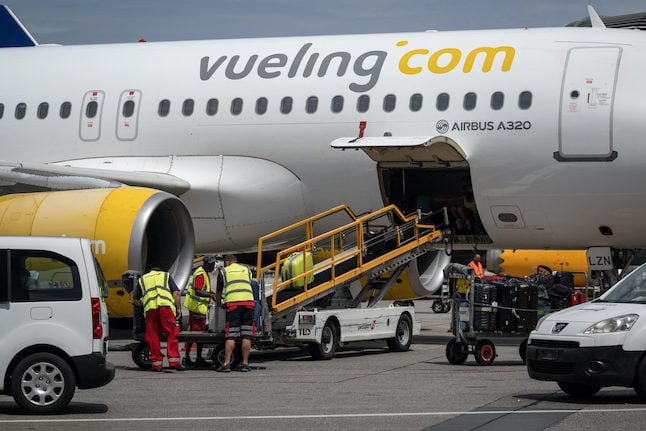Vueling Stoppages
The Vueling strikes are due to take place on Fridays, Saturdays, Sundays, Mondays and public holidays, starting on November 1st 2022 and lasting until January 31st 2023.
Additional days that will be affected are November 1st, 6th and 8th, plus December 24th and 31st and finally January 5th 2023.
Unions representing cabin crew workers belonging to Spain’s biggest low-cost have not yet confirmed how many flights are likely to be cancelled or which airports will be most affected, as they will operate minimum services.
The chosen dates are meant to cause the biggest disruption possible on travel, affecting flights around the Christmas holidays and Three Kings’ Day.
The workers are demanding a wage increase in line with the rise in prices due to inflation, as well as protesting over the precarious work conditions that have been experienced within the sector since even before the pandemic.
READ ALSO: Spain’s national rail calls train strikes: What you need to know
Stavla (Airline Flight Auxiliary Crew Union), together with union representatives has demanded a wage increase of 13.4 percent, after Vueling only offered a two percent rise.
“We cannot continue to be in the precarious situation in which we find ourselves,” said Stavla representatives. The increase “is only intended to keep up with the current standard of living,” they added.
Stavla also confirmed that if the disagreements continue, they will extend the strike “indefinitely”.
Currently, Vueling is not backing down or giving in to the workers’ demands. They describe the requests as “unfeasible” and are criticising the workers for going on strike.
The airline is still suffering from losses of €1 billion incurred during the Covid-19 pandemic, in addition to an increase in debt of €260 million to cover the impact of Covid-19 on its business.
Vueling reached an agreement with the Workers’ Commissions Union (CC.OO) in August to raise salaries by 6.5 percent, but Stavla refused to sign and now wants an even higher salary increase.
Now “is not the time to be divided but to join our efforts to build the future of Vueling together”, representatives from the airline said.
Ryanair Strikes
Ryanair has seen successive strikes since the summer and unions have threatened that they could last until January.
This time, baggage handlers and other on-the-ground staff at seven different airports will be going on strike, starting on October 28th 2022, and ending on January 7th, 2023.
It is likely these airports will include Alicante, Barcelona, Madrid, Malaga, Palma de Mallorca and Seville. However, it’s worth noting that Ryanair has said that it doesn’t actually expect this strike to cause that much disruption.
This stoppage was launched by some representatives of CC.OO. but is not backed by the union’s own leadership, after an agreement was made with the company, which prevented the strikes from spreading to more airports.
Ryanair said that they do not expect these strikes to cause much disruption.
Ongoing stoppages in the industry
Inflation, which this year has exceeded 10 percent, has been the final straw for workers in the airline sector, who not only had salaries frozen but many other issues during the Covid-19 pandemic.
Long hours and unpaid overtime, lack of personnel to cover the required services and widespread precariousness led to numerous strikes this summer by the staff of Ryanair, Easyjet, Lufthansa, Air France, SAS and Iberia Express.



 Please whitelist us to continue reading.
Please whitelist us to continue reading.
Member comments